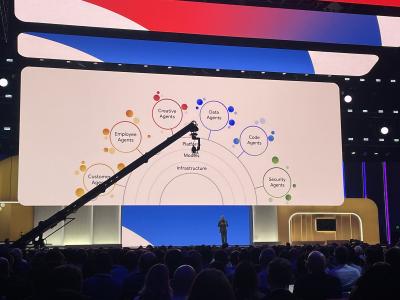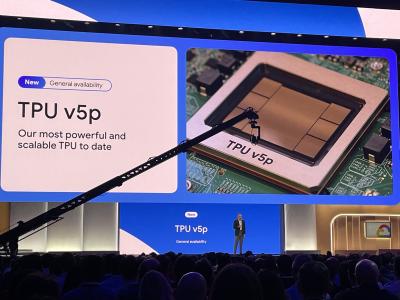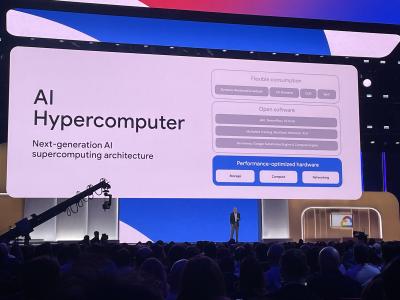GOOGLE CLOUD NEXT, LAS VEGAS – If there's one thing to take away from Google Cloud Next this year, it's that Google wants to put the AI in everything. Yes, we know there's no "a" in everything but you get the point.
To achieve its goal, it came out with a slew of announcements at Cloud Next which detailed its efforts to squeeze the technology into every nook and cranny of its portfolio. Its Gemini model is now overlaid on its Chronicle security telemetry service. It is also making an appearance in Google's databases, BigQuery software and Looker data visualization platform. Elsewhere, Vertex AI has been helpfully smushed into Workspace.

But there were a few announcements that cut through the noise (and MASSIVE keynote crowd) for us. Here's a quick rundown.
1) Gemini gets a facelift
Google's pride and joy, its Gemini AI model, is growing up. The company announced Gemini 1.5 Pro back in February, but detailed further advancements at Next. The headline? Its 1 million token model can now process audio without a transcript. It is also available in public preview for those who have Google's Vertex AI tool.
"Gemini offers the world's largest context window," Amin Vahdat, Google Cloud's VP and GM of Machine Learning, Systems and Cloud AI, said during the opening keynote.
What does that mean? Well, according to Vahdat, 1 million tokens is equivalent to about 1 hour of video, 11 hours of audio, 30,000 lines of code or 700,000 words. In practice, that means Gemini can be used to extract data from a 3,000 page document, search and analyze financial documents or identify critical issues in code bases. And the addition of audio means it now supports multi-modal searches.
Oh! And Gemini gave birth to yet another lightweight baby: CodeGemma, a tool to help generate code for enterprises. More on that, and its sister RecurrentGemma, here.
2) Vertex AI Agent Builder

According to Google, AI is ushering in an age of agents. No, not 007, but AI agents for every use case you can imagine, both internal and customer-facing. And it wants to help enterprises lead the charge with Vertex AI Agent Builder.
The tool works following a three step process. First, it uses Vertex AI to tap into Gemini Pro to create conversation flows with text, voice models and images. Next, it lets companies use natural language to implement instructions, like telling the agent to avoid discussing certain topics. And third, it allows companies to boost their response quality with Vector Search and integrated enterprise data from AlloyDB, BigQuery and more.
So get ready, the agents are coming.
3) Newly available TPU and VM

We recently noted that hyperscalers are a bigger threat to Nvidia's chip market share than the likes of Intel or even AMD. That was no exaggeration, and Google's TPU announcement proves it.
After introducing its TPU v5p in December, the company announced general availability of the platform at Next, as well as its A3 Mega virtual machines. (To be fair, though, Google Cloud does plan to support Nvidia's new GB200 platform, with availability set for early 2025.)
And here's a diagram of all that goes into Google's AI hypercomputer, because it sounds cool and why not.

Oh, and if you don't know what JAX is, you should probably get on that. It seems like it's going to be a Thing in the AI world.
The cheat sheet version: It's an AI programming framework that appears poised to replace Tensorflow.
As Vahdat put it, "JAX, an open source partnership that include Nvidia, AMD, Intel and many others, has emerged as the leading framework for the most advanced ML practioners. It allows developers to focus on treating logic declaratively, rather than partitioning code manually."
4) Axion processor
And finally, Google Cloud unveiled its Axion processor, which has been designed for data centers. It's the company's first ARM-based CPU which boasts up to 50% better performance and 60% better energy-efficiency than comparable x86-based instances.
Google Cloud has already started deploying Axion internally for BigQuery, BigTable, Google Earth Engine and its YouTube Ads platform. It'll be available externally in preview later this year.
After the keynote, we spent much of the day in meetings with top Google Cloud execs and C-Suite folks from customers and partners. So suffice to say there's plenty more news on the way. Stay tuned!